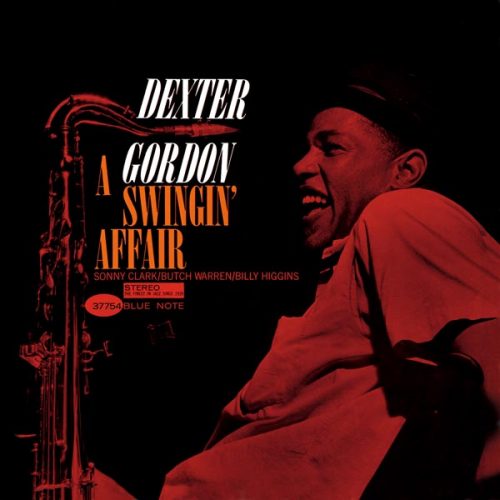February 27, 2023
Dexter Gordon, the tall tenor saxophonist from Los Angeles whose late-in-life acting role in the movie Round Midnight earned him an Oscar nomination, had a recording career that spanned five decades. From his earliest sessions under his own name in 1943 to his final album, The Other Side of Round Midnight, released in 1986, his fluid, behind-the-beat lines and full, spacious sound are instantly recognizable, and his way with a ballad (he famously recited the lyrics to himself before essaying the tunes) is unparalleled among bop and hard bop players.
Gordon recorded for a variety of labels during his long career (Savoy, Prestige, and Columbia among them), but critics and listeners alike frequently cite his mid ‘60s Blue Note albums as his finest work. This string of 11 studio sessions, beginning in May 1961 and ending almost exactly four years later, in May 1965, yielded a total of nine albums, some of which lay in the vaults for decades. But two of his best records were recorded during a single week in August 1962: GO! and A Swingin’ Affair.
On Monday, August 27, Gordon entered Rudy Van Gelder’s studio in Englewood Cliffs, NJ, accompanied by pianist Sonny Clark, bassist Butch Warren, and drummer Billy Higgins. He’d been there four times already that year: first on May 5, to record for what would become the album Landslide, then again 11 days later, for a Sonny Stitt-led session that yielded very little. On May 28, he was back, recording with Herbie Hancock for the pianist’s album Takin’ Off (which also featured Warren and Higgins), and on June 25, he cut more tracks for Landslide, with a group that included Clark.
This same trio—Clark, Warren and Higgins—had been to Rudy’s place twice in June, backing alto saxophonist Jackie McLean on the 14th and Texas tenor Don Wilkerson on the 18th. Clark, in fact, had been recording quite a bit in 1962, mostly with guitarist Grant Green and tenor saxophonist Ike Quebec. But this was the first time all four of these musicians had been on the same date.
Still, the quartet functioned like a well-oiled machine. The session kicked off with “Three O’Clock in the Morning,” a romping blues that begins with the same eight-note “grandfather clock” figure used to launch the standard “If I Were a Bell.” They took three tries to get it right, but the final version is an uptempo (but not sprinting), exciting performance that showcases Warren and Higgins’ forceful swing every bit as much as Gordon’s and Clark’s complementary, lyrical approaches to their instruments.
The second tune recorded was another romp: Billy Eckstine’s “Second Balcony Jump.” But after that, it was time for Gordon to stretch out on one of his patented ballads, in this case the Sammy Cahn/Jule Styne standard “Where Are You?” Gordon delivers a palpable sense of yearning as the tune slowly unfurls, his understanding of the lyrics allowing him to give his solo an almost Frank Sinatra-esque feel.
The tempo was raised once again after that, as the group recorded “Cheese Cake,” the only Gordon original of the day and the track that would wind up kicking off the album. It makes a terrific fanfare, Warren’s bass launching the group into motion and Higgins going at the kit with power and grace. This was followed by another slow burner, “I Guess I’ll Hang My Tears Out to Dry,” and the day concluded with one last hard-swinging blowout, this time a Latin-ized (Higgins is all over that wood block) version of Cole Porter’s “Love for Sale.”
GO!, the album that resulted from this exceptional day’s work, is rightly regarded as one of the pinnacles of Gordon’s career, and indeed one of the jewels of the entire Blue Note catalog. Muscular yet brooding, it’s one of the greatest hard bop albums of all time. Indeed, it’s such a favorite of jazz fans that it tends to overshadow the second album Gordon made with this ensemble, just two days later: A Swingin’ Affair, recorded on August 29, 1962.
A Swingin’ Affair shares its title with a Sinatra album from 1956, and both live up to the description. The Wednesday recording session began with three tunes in a row written by members of the quartet. “McSplivens” and “Soy Califa” were Gordon creations, while “The Backbone” was a Warren composition.
“McSplivens” is a basic hard bop theme, purpose-built as a platform for extended, bluesy soloing. Higgins swings hard, as Warren holds down the bottom and Clark hammers out powerful, aggressive chords on the piano. Up front, Gordon’s saxophone solo is discursively melodic, but locked into the rhythm; he punctuates the drummer’s phrases with perfectly placed low notes, and hooky, hummable lines of his own.
The second tune recorded that day, Warren’s “The Backbone,” is a bossa nova-ish hard bop groover. The third, “Soy Califa,” explores a more Afro-Cuban rhythm; the title translates to “I Am Caliph,” and the way Gordon dominates the groove, playing in a loose, almost Sonny Rollins-esque style full of hard-hit notes and metallic phrases, you believe him.
With the three originals put away, the band moved on to a trio of standards. The first, “You Stepped Out of a Dream,” is handled in an uptempo, but relaxed manner, everyone swinging with ease and comfort, letting the groove seem to push itself. The day’s work ended with two of Gordon’s patented ballad statements. “Until the Real Thing Comes Along” is an aching, nearly seven-minute exploration of romantic yearning, which includes one of Gordon’s patented quotes, this one from “Somewhere Over the Rainbow,” when he comes in after Clark’s piano solo. And the final tune of the day is a hushed, meditative meander through Billie Holiday’s “Don’t Explain,” on which Gordon’s horn is a fuzzy murmur reminiscent of Holiday’s frequent partner, Lester Young, as Higgins brushes the kit almost like he’s dusting it rather than playing it.
This matched set of August ’62 sessions are among Gordon’s finest artistic statements, showcasing him in a variety of settings (standards, originals, blues, ballads, Latin grooves) and backed by an ace piano trio. And though GO! is the better-known album, A Swingin’ Affair is every bit its equal.








